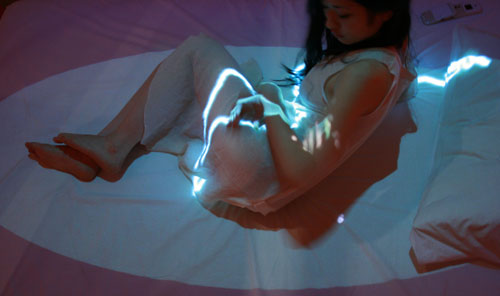Distance Lab seeking couples to test drive 'intimacy' device

Cheap air travel and the Web undermine the impact of distance, but geographically separated couples could use a better alternative than technologies like text, email, and video chat when physical intimacy is not an option.
Enter Mutsugoto, a device designed to communicate intimacy by allowing for couples, who are separated by distance, to draw in light on each other's bodies or beds.

According to Distance Lab, the creator of the device, the drawings are transmitted "live" between the two beds by a custom computer vision and projection system. It enables a "different kind of synchronous communication that leverages the emotional quality of physical gesture."
Distance Lab and partner New Media Scotland are looking for three couples in long distance relationships to test the device (if interested, go here).
Mutsugoto will appear this summer at the Edinburgh Art Festival thanks to an Alt-w Production award.
Distance Lab is a multidisciplinary research organization full of eccentric thinkers based in a remote part of Scotland. Working with digital media technology and design, the lab is focused on the theme of distance. In addition to Mussugoto, the lab is engaged in a variety of novel projects that are intended to "inspire and challenge assumptions about how we use technology and how we will deal with various forms of distance in the future."
For instance, Remote Impact is an interactive boxing game that enables a full body contact experience as people punch and kick a silhouette projected on to a mattress and can register brute force.
Another example is Oral Wiki, a voice-based wiki system designed to get around the lack of literacy and Internet availablity in sub-Saharan Africa, and is intended to strengthen informal justice systems.